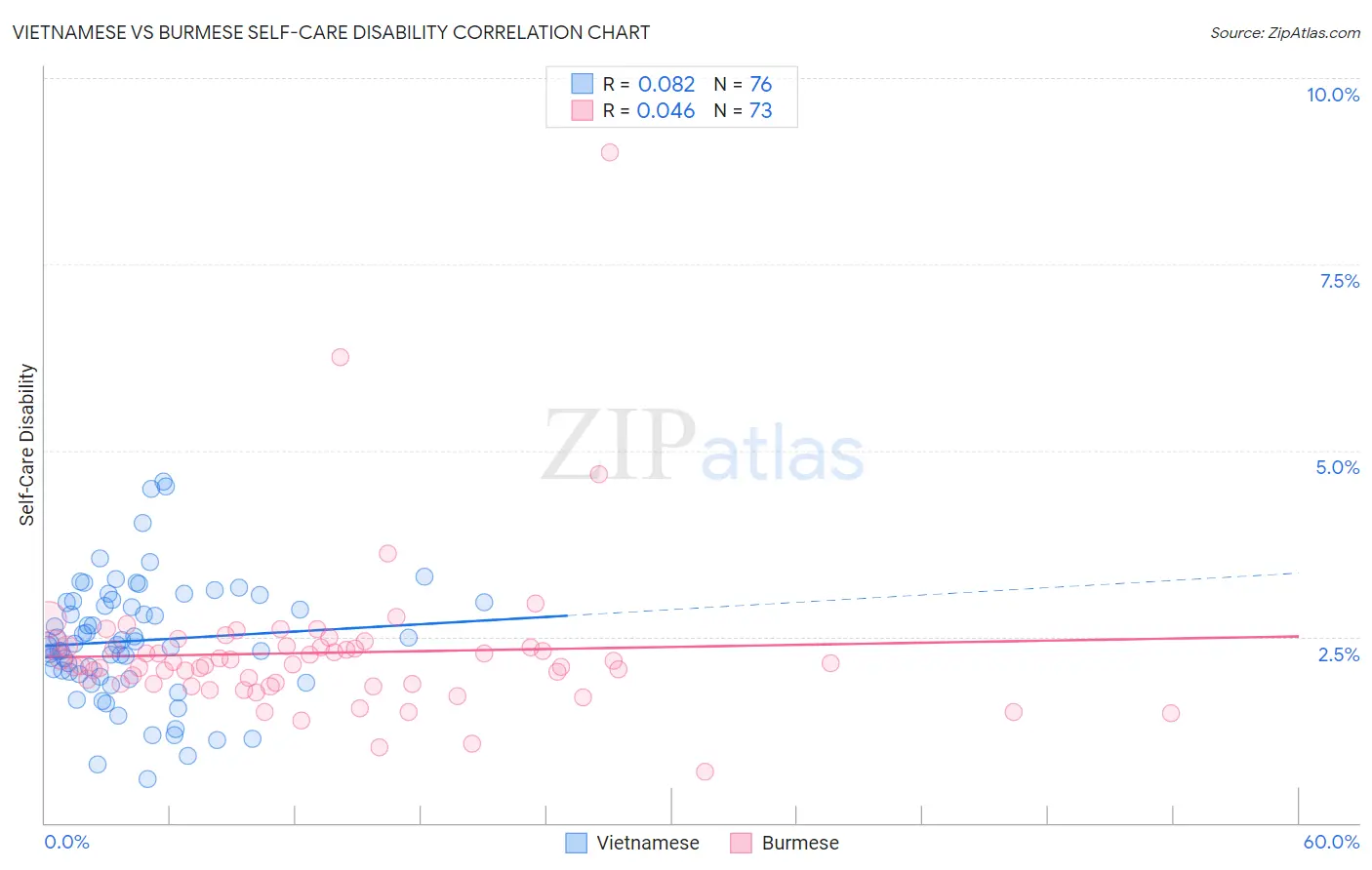Vietnamese vs Burmese Self-Care Disability
COMPARE
Vietnamese
Burmese
Self-Care Disability
Self-Care Disability Comparison
Vietnamese
Burmese
2.6%
SELF-CARE DISABILITY
2.1/ 100
METRIC RATING
234th/ 347
METRIC RANK
2.3%
SELF-CARE DISABILITY
99.9/ 100
METRIC RATING
32nd/ 347
METRIC RANK
Vietnamese vs Burmese Self-Care Disability Correlation Chart
The statistical analysis conducted on geographies consisting of 170,626,473 people shows a slight positive correlation between the proportion of Vietnamese and percentage of population with self-care disability in the United States with a correlation coefficient (R) of 0.082 and weighted average of 2.6%. Similarly, the statistical analysis conducted on geographies consisting of 464,418,489 people shows no correlation between the proportion of Burmese and percentage of population with self-care disability in the United States with a correlation coefficient (R) of 0.046 and weighted average of 2.3%, a difference of 14.2%.

Self-Care Disability Correlation Summary
| Measurement | Vietnamese | Burmese |
| Minimum | 0.58% | 0.68% |
| Maximum | 4.6% | 9.0% |
| Range | 4.0% | 8.3% |
| Mean | 2.4% | 2.3% |
| Median | 2.4% | 2.1% |
| Interquartile 25% (IQ1) | 2.0% | 1.9% |
| Interquartile 75% (IQ3) | 3.0% | 2.4% |
| Interquartile Range (IQR) | 0.99% | 0.51% |
| Standard Deviation (Sample) | 0.82% | 1.1% |
| Standard Deviation (Population) | 0.81% | 1.1% |
Similar Demographics by Self-Care Disability
Demographics Similar to Vietnamese by Self-Care Disability
In terms of self-care disability, the demographic groups most similar to Vietnamese are Liberian (2.6%, a difference of 0.010%), Bahamian (2.6%, a difference of 0.040%), Albanian (2.6%, a difference of 0.050%), Immigrants from Guatemala (2.6%, a difference of 0.070%), and Bermudan (2.6%, a difference of 0.10%).
| Demographics | Rating | Rank | Self-Care Disability |
| Immigrants | Philippines | 2.7 /100 | #227 | Tragic 2.6% |
| Guatemalans | 2.7 /100 | #228 | Tragic 2.6% |
| Guamanians/Chamorros | 2.5 /100 | #229 | Tragic 2.6% |
| Immigrants | Ecuador | 2.5 /100 | #230 | Tragic 2.6% |
| Immigrants | Guatemala | 2.2 /100 | #231 | Tragic 2.6% |
| Albanians | 2.2 /100 | #232 | Tragic 2.6% |
| Liberians | 2.1 /100 | #233 | Tragic 2.6% |
| Vietnamese | 2.1 /100 | #234 | Tragic 2.6% |
| Bahamians | 2.0 /100 | #235 | Tragic 2.6% |
| Bermudans | 1.9 /100 | #236 | Tragic 2.6% |
| Immigrants | Senegal | 1.6 /100 | #237 | Tragic 2.6% |
| Senegalese | 1.3 /100 | #238 | Tragic 2.6% |
| Immigrants | Panama | 1.2 /100 | #239 | Tragic 2.6% |
| Marshallese | 1.2 /100 | #240 | Tragic 2.6% |
| Immigrants | Syria | 1.0 /100 | #241 | Tragic 2.6% |
Demographics Similar to Burmese by Self-Care Disability
In terms of self-care disability, the demographic groups most similar to Burmese are Danish (2.3%, a difference of 0.070%), Paraguayan (2.3%, a difference of 0.080%), Immigrants from Korea (2.3%, a difference of 0.23%), Immigrants from Turkey (2.3%, a difference of 0.29%), and Immigrants from Australia (2.3%, a difference of 0.35%).
| Demographics | Rating | Rank | Self-Care Disability |
| Turks | 100.0 /100 | #25 | Exceptional 2.2% |
| Immigrants | Sri Lanka | 99.9 /100 | #26 | Exceptional 2.2% |
| Venezuelans | 99.9 /100 | #27 | Exceptional 2.2% |
| Inupiat | 99.9 /100 | #28 | Exceptional 2.2% |
| Immigrants | Zimbabwe | 99.9 /100 | #29 | Exceptional 2.3% |
| Paraguayans | 99.9 /100 | #30 | Exceptional 2.3% |
| Danes | 99.9 /100 | #31 | Exceptional 2.3% |
| Burmese | 99.9 /100 | #32 | Exceptional 2.3% |
| Immigrants | Korea | 99.9 /100 | #33 | Exceptional 2.3% |
| Immigrants | Turkey | 99.9 /100 | #34 | Exceptional 2.3% |
| Immigrants | Australia | 99.9 /100 | #35 | Exceptional 2.3% |
| Immigrants | Lithuania | 99.9 /100 | #36 | Exceptional 2.3% |
| Immigrants | Sweden | 99.9 /100 | #37 | Exceptional 2.3% |
| Immigrants | Eastern Africa | 99.9 /100 | #38 | Exceptional 2.3% |
| Immigrants | Bulgaria | 99.8 /100 | #39 | Exceptional 2.3% |